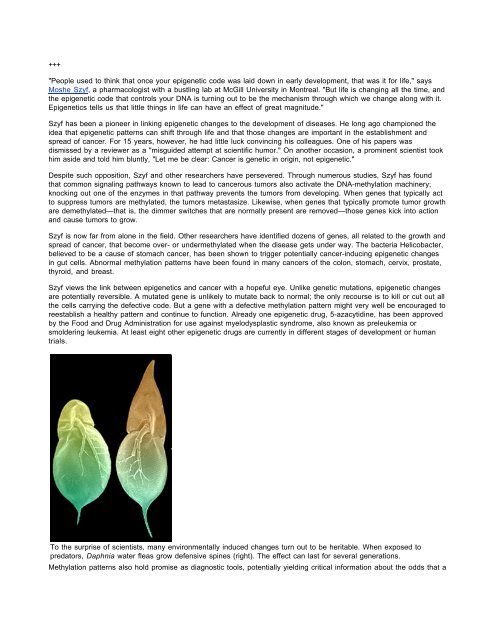DNA Is Not Destiny | Living World | DISCOVER Magazine
DNA Is Not Destiny | Living World | DISCOVER Magazine
DNA Is Not Destiny | Living World | DISCOVER Magazine
You also want an ePaper? Increase the reach of your titles
YUMPU automatically turns print PDFs into web optimized ePapers that Google loves.
+++<br />
"People used to think that once your epigenetic code was laid down in early development, that was it for life," says<br />
Moshe Szyf, a pharmacologist with a bustling lab at McGill University in Montreal. "But life is changing all the time, and<br />
the epigenetic code that controls your <strong>DNA</strong> is turning out to be the mechanism through which we change along with it.<br />
Epigenetics tells us that little things in life can have an effect of great magnitude."<br />
Szyf has been a pioneer in linking epigenetic changes to the development of diseases. He long ago championed the<br />
idea that epigenetic patterns can shift through life and that those changes are important in the establishment and<br />
spread of cancer. For 15 years, however, he had little luck convincing his colleagues. One of his papers was<br />
dismissed by a reviewer as a "misguided attempt at scientific humor." On another occasion, a prominent scientist took<br />
him aside and told him bluntly, "Let me be clear: Cancer is genetic in origin, not epigenetic."<br />
Despite such opposition, Szyf and other researchers have persevered. Through numerous studies, Szyf has found<br />
that common signaling pathways known to lead to cancerous tumors also activate the <strong>DNA</strong>-methylation machinery;<br />
knocking out one of the enzymes in that pathway prevents the tumors from developing. When genes that typically act<br />
to suppress tumors are methylated, the tumors metastasize. Likewise, when genes that typically promote tumor growth<br />
are demethylated—that is, the dimmer switches that are normally present are removed—those genes kick into action<br />
and cause tumors to grow.<br />
Szyf is now far from alone in the field. Other researchers have identified dozens of genes, all related to the growth and<br />
spread of cancer, that become over- or undermethylated when the disease gets under way. The bacteria Helicobacter,<br />
believed to be a cause of stomach cancer, has been shown to trigger potentially cancer-inducing epigenetic changes<br />
in gut cells. Abnormal methylation patterns have been found in many cancers of the colon, stomach, cervix, prostate,<br />
thyroid, and breast.<br />
Szyf views the link between epigenetics and cancer with a hopeful eye. Unlike genetic mutations, epigenetic changes<br />
are potentially reversible. A mutated gene is unlikely to mutate back to normal; the only recourse is to kill or cut out all<br />
the cells carrying the defective code. But a gene with a defective methylation pattern might very well be encouraged to<br />
reestablish a healthy pattern and continue to function. Already one epigenetic drug, 5-azacytidine, has been approved<br />
by the Food and Drug Administration for use against myelodysplastic syndrome, also known as preleukemia or<br />
smoldering leukemia. At least eight other epigenetic drugs are currently in different stages of development or human<br />
trials.<br />
To the surprise of scientists, many environmentally induced changes turn out to be heritable. When exposed to<br />
predators, Daphnia water fleas grow defensive spines (right). The effect can last for several generations.<br />
Methylation patterns also hold promise as diagnostic tools, potentially yielding critical information about the odds that a


